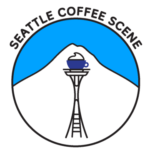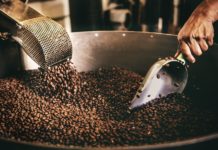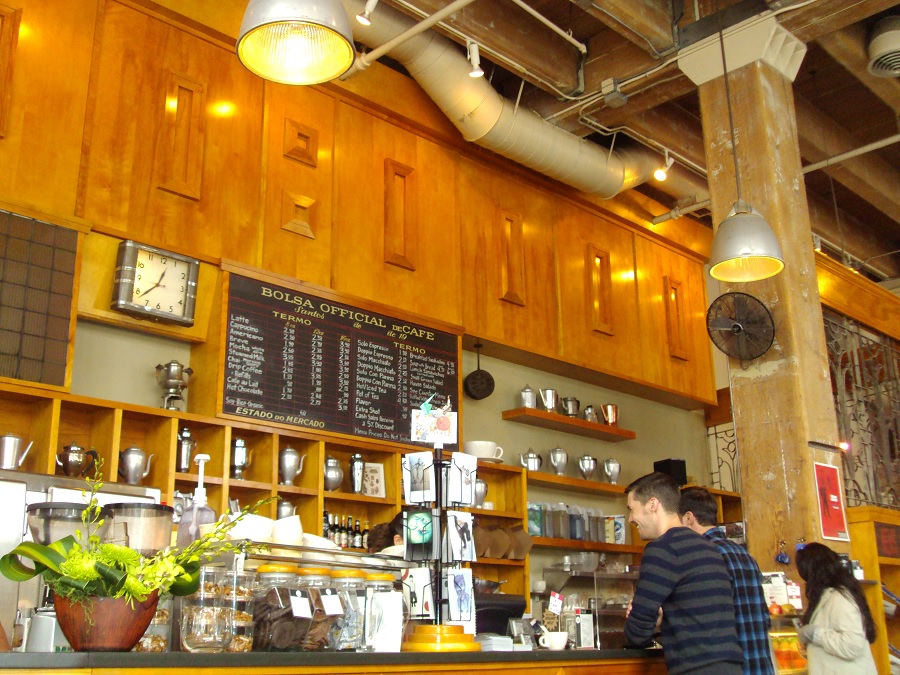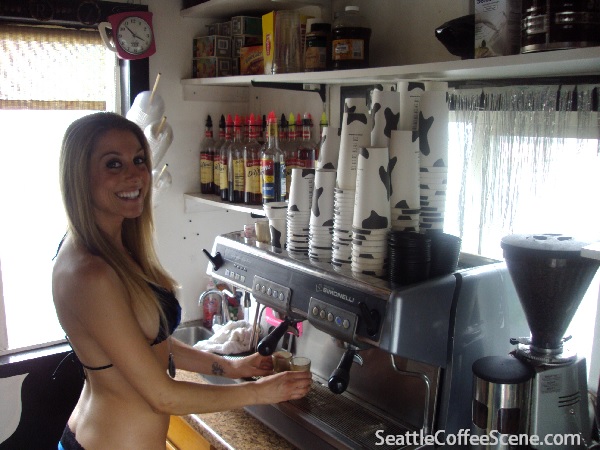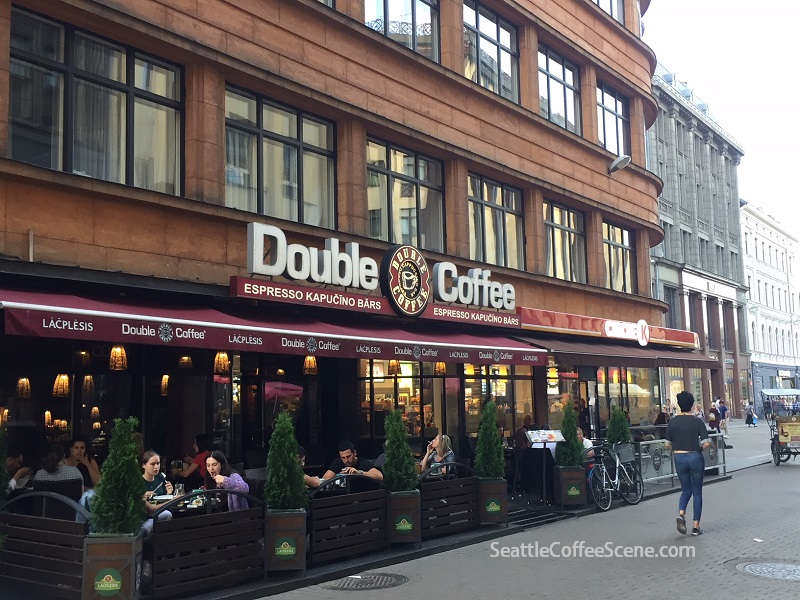
Exploring Coffee in the Baltics
On a late August morning in Vilnius, modern jazz is piping through the speakers at Huracán Coffee, a handsome-industrial Third Wave coffee bar in the city’s Old Town.
Huracán Coffee is one of several major coffee companies that have sprouted across this Eastern European Capital over the last decade, each offering its own roasting profiles, ambiance, and customer experience.
The place is buzzing with well-groomed professionals, students, and other locals enjoying well-poured coffees discriminately chosen to meet the high standards the café is known for.
Scanning the menu and assortments of cakes, chocolate tarts, and pastries, I order my morning usual, an Americano with a croissant.
Huracán is a vibrant coffee spot located on Vokiečių Gatvė, the main artery of foot traffic in the city’s old town, making it a perfect place for people watching.

I find a table just vacated by a young family and perch myself to witness a small sampling of what’s happening with coffee here in the Baltics.
Without a doubt, this little corner of the world is riding the wave of a thriving coffee scene.
Wait… I know what you’re probably thinking…
Where are the Baltics, exactly?
Quickly scan a map of Europe, and you might miss them.
Place your fingertip right dab in the middle of a Continental European map… move slowly right and then up. You’ll hit them.
Sharing a picturesque coastline with the Baltic Sea, the republics of Lithuania, Latvia, and Estonia are wedged between Russia to the East, Poland to the West, and Belarus to the South.
With many independent coffee bars and coffee roasters to larger, well-funded coffee chains establishing themselves over the last decade, the Baltics are awash in coffee – sometimes, really, really good coffee – at least in the capital cities and larger towns.
And the coffee boom is only getting started.
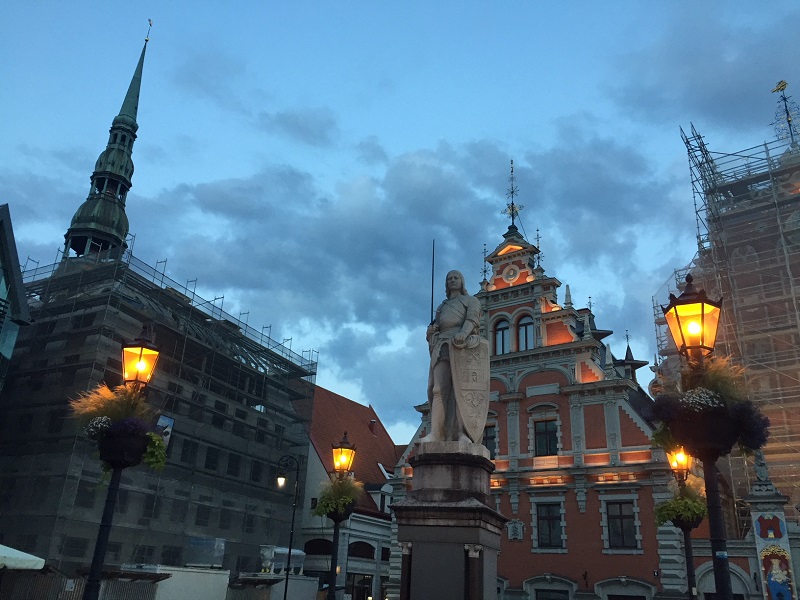
Travel to any of the capital cities of Vilnius, Riga, and Tallinn, and you’ll have a relatively easy time finding well-poured lattes, perfectly pulled espresso shots and elegantly brewed pour-overs from customer-oriented baristas.
Greater access to specialty coffee is spreading to smaller towns throughout the Baltics – places like Palanga on the Lithuanian Coast, Jūrmula in Latvia, and Tartu in Estonia, you’ll have no trouble finding cold brews, pour-overs, or tasty lattes with well-steamed milk.
While there is certainly room for much more growth and improvement with coffee in the region, the transformation has been remarkably stark, especially since my first visit to the region in 2002.
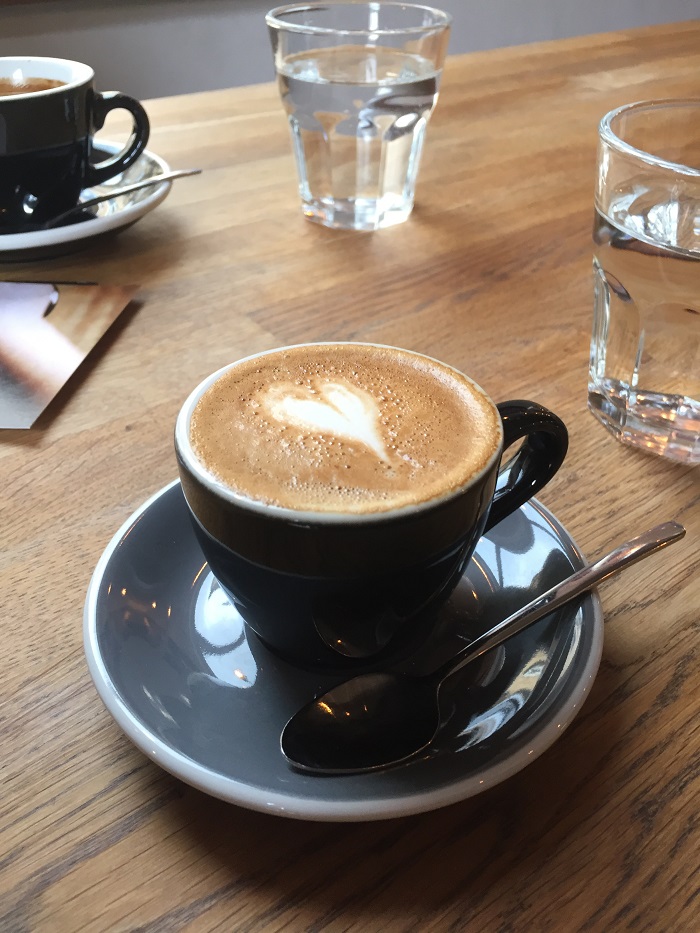
For the traveler who hails from the Pacific Northwest, these small coffee spots can be an oasis of familiarity in the Baltics. For example, this particular Huracán Coffee location sports the only known Clover coffee brewer in existence on this side of the Atlantic.
The growth of the Baltic coffee scene is perhaps a modern-day economic barometer to the region’s overall retail vibrancy.
Café, restaurants, bars, fashion boutiques, and larger name-brand stores fill the local malls like the Gedimino 9 shopping mall or the Akropolis Shopping Center in a neighboring town of Kaunas, all point to retail health.
In Vilnius alone, other trendy and local cafes with names like Taste Map, Vero Café, Strange Love, Coffee1, Elska Coffee, Small Talk, Chaika Coffee are just a growing sample of coffee shops here.
It certainly wasn’t always this way for these young nations. They have had their struggles and growing pains since they’ve declared independence a quarter-century ago.
Some locals will tell you that it took a lot to get here – including a revolution, a culture shift, and the emergence of a Westernized economy.
But how and when did it all start?
Like San Francisco in the 1970s and Seattle in the 1980s, perhaps the coffee scene here can arguably be traced to a few aspirational coffee entrepreneurs who grew up under radically different circumstances as compared with today.
For a half-century, the three tiny republics sat under the heavy hand of Soviet control and oppression.
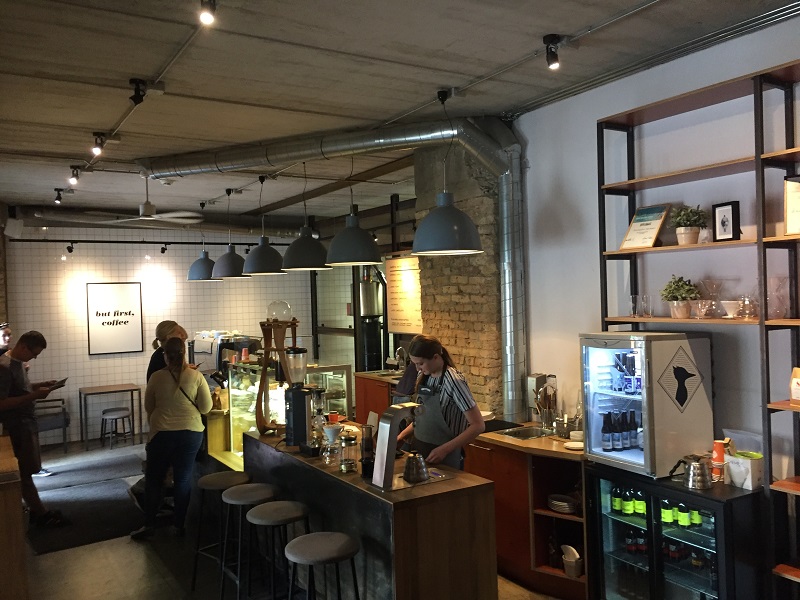
Fresh coffee wasn’t even a consideration at the time, nor was it high on the list of most people living in the Baltics.
Rather, it was mostly about survival.
Looking back, it may have been easier to see that a tipping point was occurring in the Baltics.
People were tired of a corrosive system of government, rampant corruption, nepotism, and lack of mobility. They wanted freedom, sovereignty, and the ability to choose their own direction.
The timing was right for a change.
The heavyweight of harsh economic and social realities was giving way to a cracking Soviet Empire in decline.
Revolution was in the air.
But the Baltics were strategically important to the Soviets. Access to the Baltic ports as well as a land buffer between Western democracies was vital.
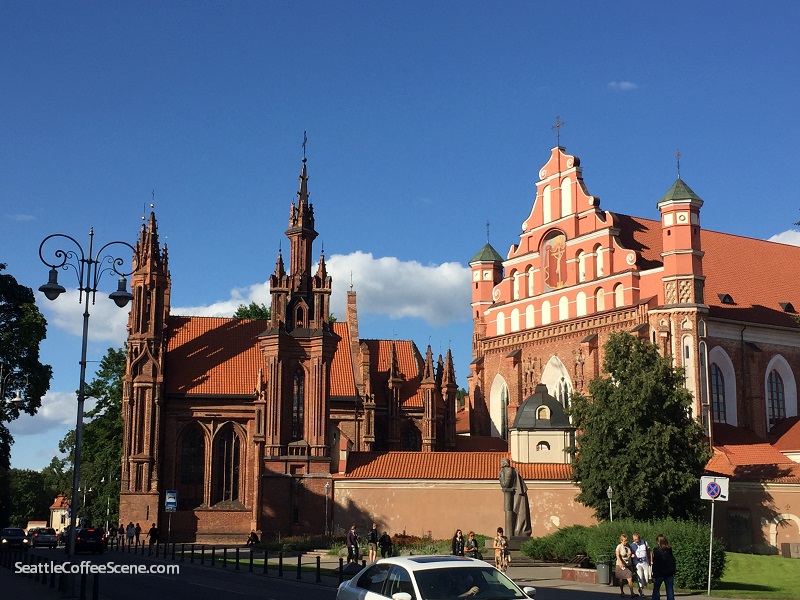
And the Iron Fist would try to toughen its grip around these states until Lithuania and Latvia would declare their independence in 1990. Similarly, in an extraordinary event that they called a Singing Revolution, Estonia declared independence a year later.
Not to be outdone, the Soviets responded by sending tanks, firing on innocent civilians resulting in the death of over a dozen people in Lithuania.
Mounting global pressure would end the violence, and the countries would gain their independence the following year.
The Soviet life left its mark on life in the Baltics.
During Soviet occupation, engaging in any commerce was disparagingly thought of as “speculation” and could land you in jail.
This is the life that today’s Baltic coffee entrepreneurs grew up in, and it would have a profound effect on coffee pioneers in the region.
But when it comes to coffee, the Baltics were uniquely positioned for the scene they are experiencing today.
“Since the Soviet times, the Baltic states were considered to be coffee republics. And the rest of the states were tea republics, that’s why nowadays they have the largest consumption of instant coffee,” stated Kratulis, owner of Huracán Coffee, a recognized coffee roaster who has spearheaded the Baltic emergence of high-quality coffee over the last 25 years.
Kratulis started roasting coffee back in 1999 in a small shop in Vilnius. Soon after, he opened his first small coffee shop, which he appropriately called Šviežia Kava, which means “Fresh Coffee.”
While naming his coffee business Fresh Coffee might seem unremarkable and generic at first glance, it was really the start of his effort to educate his customers who were unfamiliar with the concept of drinking fresh, high-quality coffee.
Kratulis built his steadily growing coffee company literally from the ground floor up. He started roasting underneath an industrial stairwell in a small commercial building.
Back in the late 1990s, the idea of having “fresh” locally roasted coffee was considered an oddity to many people who grew up drinking Soviet coffee.
“The level of skepticism was high,” Kratulis writes on his website. “However, talk of the importance of freshness, the differences in quality and flavor, was not convincing everybody: “how can such young people know anything about coffee?” he added, recalling his initial days as a coffee entrepreneur.
Certainly, two generations of coffee drinkers only had experienced low-quality coffee sourced from places like India, roasted in Russia, and later shipped to the rest of the Soviet satellite states like the Baltics after many, many months, if not years, in storage.
In other words, freshness wasn’t something attributed to coffee.
Over time, a significant shift occurred.
“We are going toward quality, definitely,” said Vytautas Kratulis, owner of Huracán Coffee, who just opened his ninth location earlier this year in Lithuania. “People are demanding more and more quality for the money they spend.”
Kratulis’ Coffee Shop’s name, “Fresh Coffee,” would eventually serve out its purpose to educate local coffee drinkers.
As coffee shops and coffee roasters would arrive on the scene, and more and more locals traveled abroad and experienced quality coffee, it was only time that freshly roasted coffee would not be a novelty in Lithuania but an expectation.
This was true for other parts of life in the Baltics.
The former Soviet Union citizens, who were once relegated to dire supplies of fresh consumables, were now expecting better quality products and services in all aspects of their lives – including coffee.
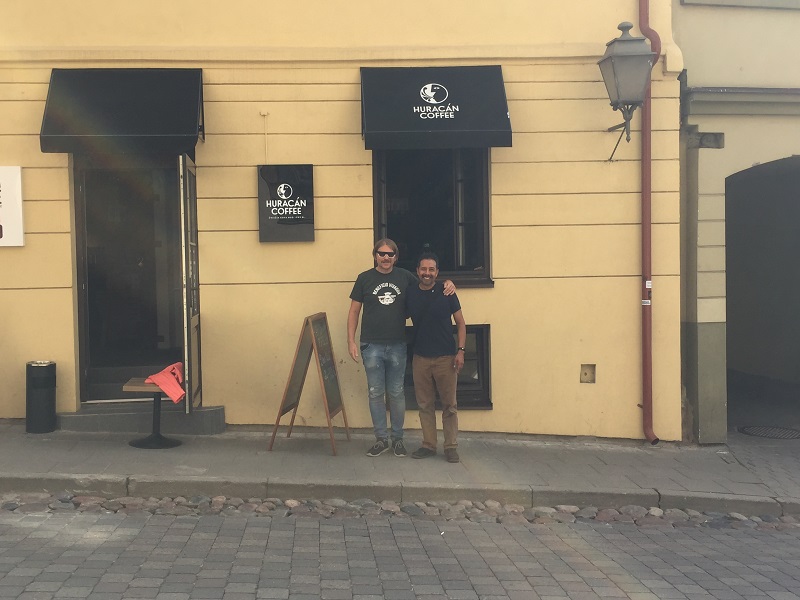
Kratulis would later rebrand his coffee business to Huracán Coffee, a name that would also be easier for those in coffee origin countries and elsewhere to spell, pronounce, and remember.
Rebranding his coffee company was a business decision that makes sense as he embarks on making global partnerships and reaching out to those on distant coffee farms.
While the region still struggles with stagnating wages and rising prices, it’s a far cry from a generation ago.
And the future looks promising, especially when it comes to the quality of coffee in the region.
“Today I believe, that in the coffee business, Lithuania is number one out of all Baltic republics in terms of good coffee, understanding of coffee freshness, coffee origins, coffee brewing techniques, and the role of quality equipment,” Kratulis added.
Today, taken together, nearly 6 million people live in the three nations.
The Baltics are all members of the European Union since 2004, all members of NATO, all use the Euro, and are all a part of the Schengen Zone, which allows people to travel without a visa within the zone.
You can’t travel through the Baltics without noticing Caffeine Roasters, a Vilnius-based coffee company with well over 40 locations throughout Lithuania, Latvia, and Estonia (they also have a location in Florida).
The bright orange cups from Caffeine Roasters are carried like flashlights at a campsite at night. They are everywhere.
Certainly, Caffeine Roasters have successfully penetrated the market like no other coffee company in the region.
Despite their growth, they’ve worked hard to maintain quality, offering their customers convenience, quality, and status in the same way Starbucks does elsewhere.
In neighboring Latvia, there are also a few good standouts on the coffee scene as well.
Rocket Bean Roastery is one of Latvia’s largest and edgier coffee roasters that is certainly making a name for itself.
Rocket Bean’s flagship café near Riga’s old town is certainly impressive. They’ve embarked on an aggressive marketing effort to stand out among the crowded field of roasters and cafes, naming their coffee blends ear-plugging names like Magic Pussy.
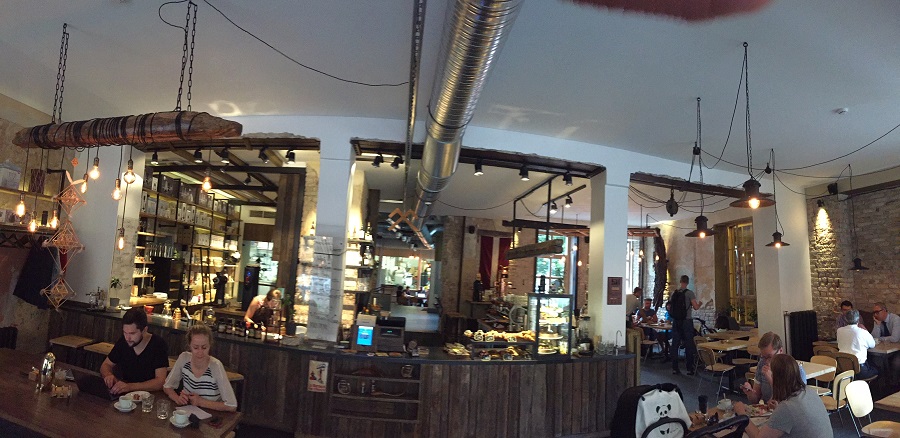
It is a gorgeous, high-energy space with an open coffee bar and seating area where their roasting facility can be seen.
Rocket Bean is dedicated to strong marketing, quality and service, and growth beyond their current market.
“We didn’t want to open a roaster or a production site. We wanted to showcase,” stated Rocket Beans’ Managing Director, Ancis Romanovskis.
“Latvia is a very small market; it has less than 2 million people. We were always focused on a global scale; we want to be recognized as global roasters,” he added.
Like Kratulis, Rocket Bean struggled early with educating their local market.
“It was tough on the local market in the beginning because we had to create an understanding of what specialty coffee is. We were practically the first specialty coffee shop plus roasters (in Latvia),” Romanovskis stated.
For the last decade, coffee consumption in the region is trending upwards. The last available numbers of coffee consumption come from McDonald’s who has a well-established presence in the Baltics and an ability to discern coffee consumption from year to year.
For example, in the last publicly available data, McDonald’s’ has seen their coffee sales volume jump: 31% in Lithuania, 7% in Latvia, and 12% in Estonia in 2012, compared to the year before, according to the Baltic News Network.
Like any industry, one could ask if there are any challenges to the growth as they move forward?
Sure. For one thing, the market is small, which explains why there is a push for rebranding and expansion. Low wages and increasingly higher prices can make coffee consumption a difficult daily splurge.
Wages and discretionary income is a real problem in the Baltics, which is perhaps why Starbucks is absent from the area (The closest known Starbucks is currently in Helsinki, Finland).
And yet, the coffee scene continues to develop and thrive.
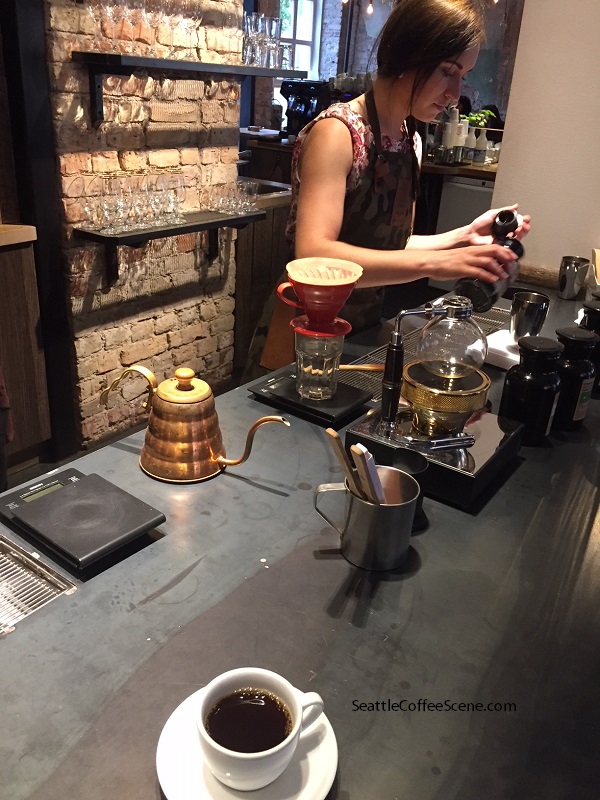
Today you can find wonderfully roasted coffee from Guatemala, El Salvador, Brazil, Ethiopia, and other origin countries – to the delight of customers all over the Baltics.
And despite the challenges, I have a good feeling it’s only going to get better.
For Kratulis, coffee’s growth in the Baltics is clearly personal and extends beyond coffee. It has been a sustained and evolving passion that has driven him and his team for the last two decades.
“I’m acting as an ambassador of my own country. Lithuania is a young country in foreign relations, and I’m trying to build direct connections and make Lithuania important for Bolivia, Costa Rica, Colombia, etc. I bring the knowledge that we are also a coffee country,” said Kratulis.
